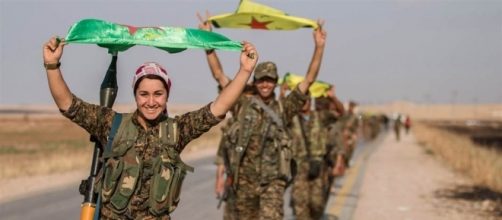The war against Daesh in Syria, a derogatory reference to ISIS, has progressed remarkably in recent months. The Kurdish-Arab alliance backed by the United States, called the Syrian Democratic Forces (SDF), has captured large swaths of ISIS territory and sits within 20 miles from their capital, Raqqa. However, tensions are already rising among the regional players as they prepare to dispatch the self-proclaimed Islamic State.
Background
The animosity between the Kurds and Arabs has become particularly palpable as ISIS retreats and a power vacuum is left in its wake.
The Kurdish portion of the SDF, known as the People’s Protection Units or YPG, is by far the SDF’s most capable fighting unit. Therefore, tensions are brewing between the two ethnic groups because the Arabs are pissed off at the Kurdish stranglehold on operations. The Arabs do not want the YPG to maintain control of land that is overwhelmingly Arab.
Meanwhile, the Kurds are taking full advantage of the chaos to try and carve out a homeland of their own. The Kurdish people are spread out across multiple nation-states throughout the Middle East and want to control as much land as possible. The more territory the Kurds control, the more bargaining chips they would have to create their own nation-state.
Below is a video reference for Kurdish-inhabited areas & what Kurds consider to be "Kurdistan":
Developing conflicts of interest
Needless to say, Arab leaders have been vocalizing their discontent:
“All the Arabs know that the SDF are YPG, and if things continue as they are, there will be big problems in the future, sectarian clashes and conflict,” Abu Issa said.
“People don’t understand why the YPG are going to Raqqa. It’s an entirely Arab area, and the Arabs feel marginalized.”
Unfortunately, Mr. Issa, the Kurdish forces are undeniably the best fighters so the coalition only advances as they do. Yes, the Kurds are trying to carve out a state for themselves, but no one else can do job.
American commanders on the ground understand the issues that are arising with the Kurdish-assisted push on Raqqa. The reality is that the Arab forces are not capable of carrying the weight alone. The success & capabilities of the YPG are unparallel and therefore integral to the continued success:
"The only force that is capable on any near-term timeline is the Syrian Democratic Forces, of which the YPG are a significant portion,” Lt. Gen. Stephen Townsend told reporters last month."
However, Mr. Issa does illustrate an obvious Catch-22 for the post-ISIS era (post-ISIS-ish is more appropriate, violent Sunni extremism will never be fully eradicated). The US-backed Arab forces cannot successfully engage Daesh without overwhelming help from the Kurds.
Since the Kurds will continue to lead the charge into Raqqa, an entirely Arab area, sectarian clashes between the two groups will undoubtedly commence.
Bottom-line
Kurds vs. Arabs is only the tip of the iceberg. Turks, Assad regime, Americans, Russians, Iranians… The list goes on and on. Everybody wants a piece of the pie. Unifying to fight a common enemy is the easy part, post-ISIS is where things get hairy.

